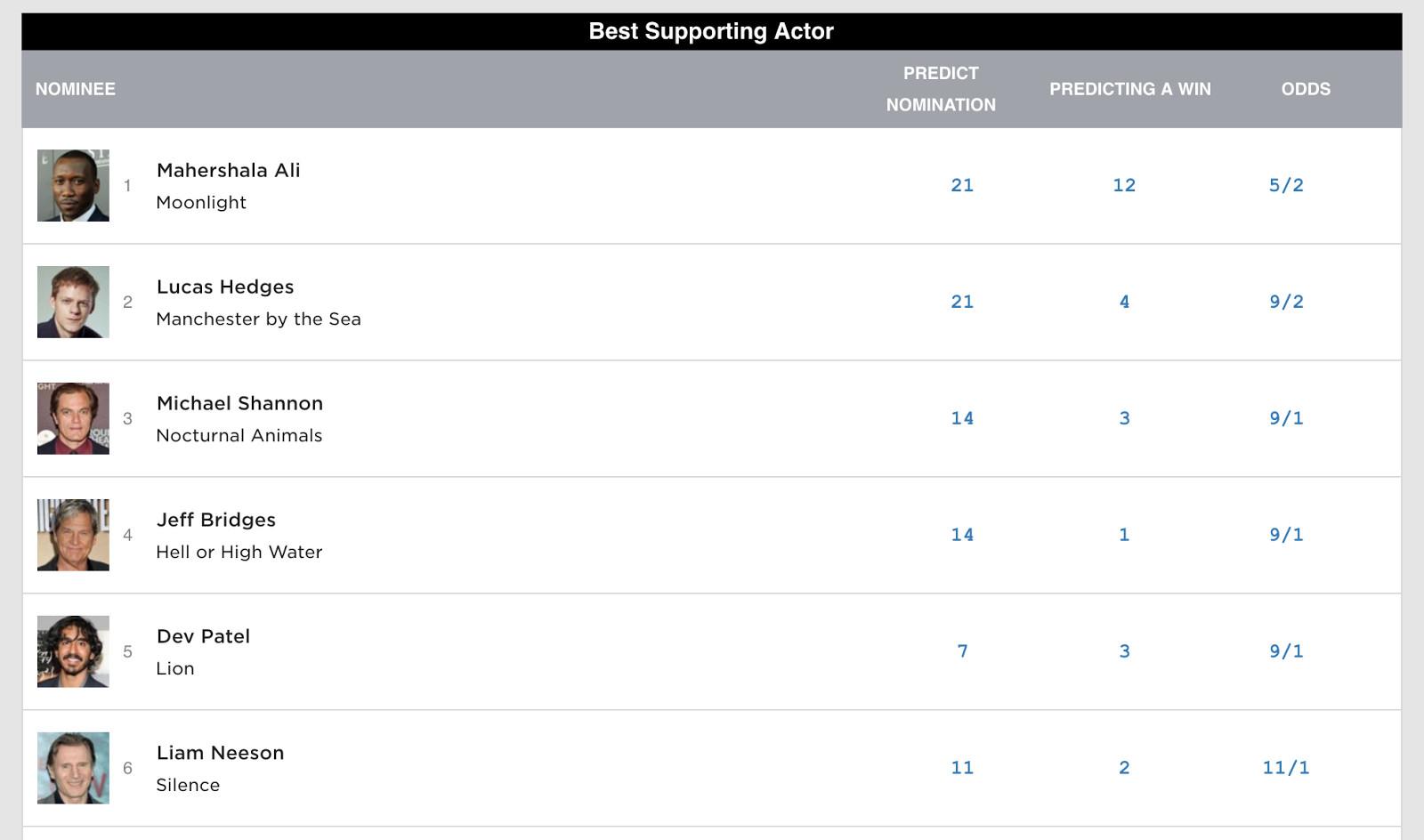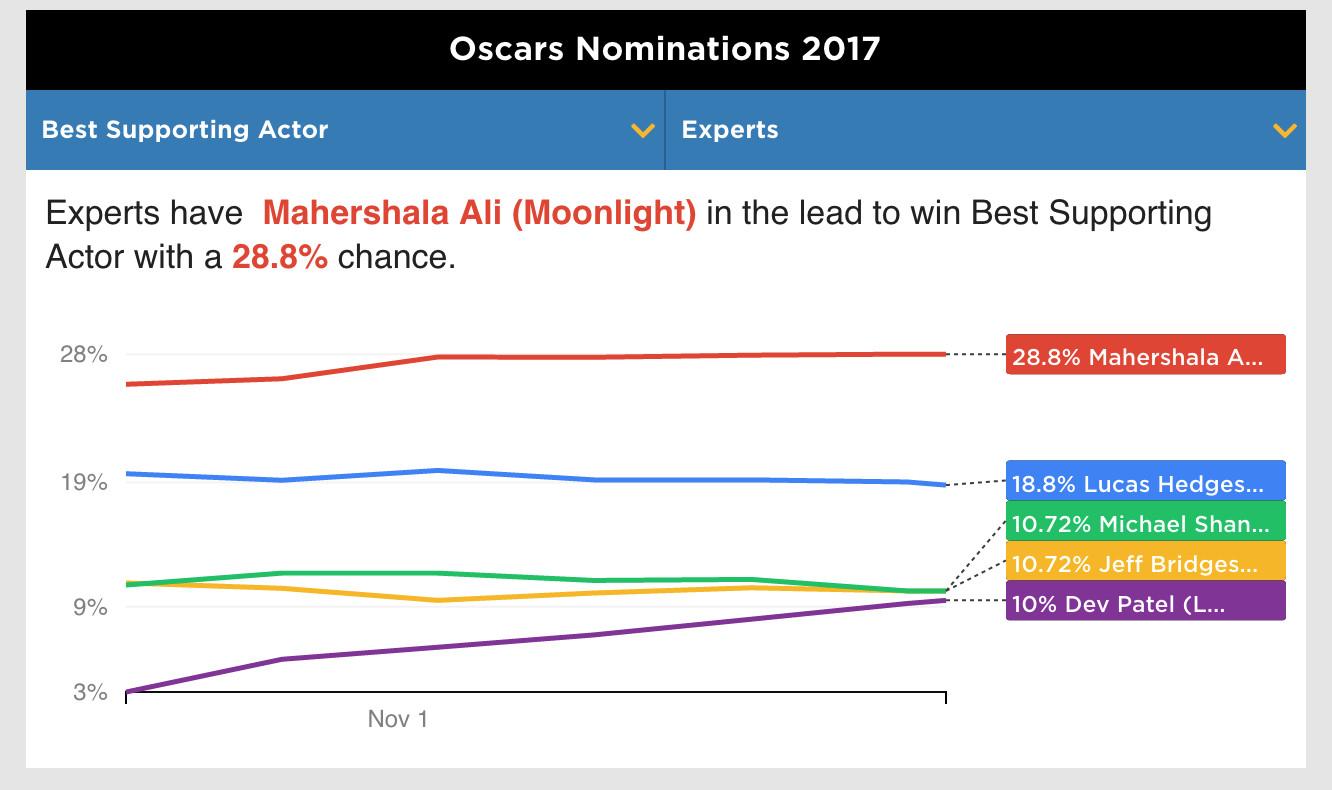This week, six Ringer staffers get in on the Statue Mongering fun. The Oscars are coming — and we’ve got some questions.
What If the Oscars Were Purely Populist?
Chris Ryan: Back in 2010, the Academy Awards expanded the field for Best Picture from five movies to upward of 10. The reason was to give movies like The Dark Knight — which, despite its critic-tested, masses-approved status, did not make the five-movie cut in 2009, elbowed out by Milk, Slumdog Millionaire, The Reader, Frost/Nixon, and The Curious Case of Benjamin Button — a shot at Oscar glory. The more popular movies Oscar fêted, the more popular the Academy Awards would become. That was the thinking, at least. Since then, there’s been periods of harmony between the box office and the awards circuit (2015’s The Martian and The Revenant were among the most decorated and popular films of the year), but no such synergy will take place in 2016. Of the top 40 movies in the 2016 domestic box office chart, only Sully has a realistic shot at making the Best Picture cut. And it’s hard to imagine forthcoming features like La La Land, Silence, or Manchester by the Sea racking up serious receipts.
By way of analyzing the gap between popularity and acclaim, let’s ask: What nominees for major categories could be pulled from that group of 40? Excepting animated films, which have their own category and aren’t real movies anyway, there are few bright spots. But they’re long, long, long shots: Fede Alvarez did some dark, disturbing, and virtuosic things directing Don’t Breathe; Peter Sarsgaard or Ethan Hawke could get Best Supporting Actor shouts for The Magnificent Seven, because I am who I am. If you were trying to open up the tent, you could make the argument for Robert Downey Jr. as Best Actor for Captain America: Civil War, or Ryan Reynolds for Deadpool. Suicide Squad’s Margot Robbie or Bad Moms’ Kathryn Hahn could get some Best Supporting Actress love, and Mary Elizabeth Winstead and John Goodman did great work in 10 Cloverfield Lane. What else? Nothing else: By this point, we are basically down to sausages, fish, peculiar children, ninja turtles, and jungle books. The question facing the Academy, then: Is there really much use in having a big tent if there aren’t any movies worthy of invitation?
Who Will Win Best Trailer?
Amanda Dobbins: It’s not Best Picture, but five years after The King’s Speech defeated The Social Network for the top Oscar, you know which awards really matter. The juice is in the trailer; it’s what separates the Inceptions and the Inherent Vices from the Birdmans of this world. Ten years from now, you won’t remember who won Best Director, but you’ll remember the best movie advertisement that made you cry at your desk.
So, what to make of our current crop of Best Picture trailers? Moonlight’s is moving and quiet; Lion’s is sentimental Weinstein awards bait; Arrival’s spoils the fun. Manchester by the Sea’s trailer seems entirely divorced from the reality of a Kenneth Lonergan film about Catholic guilt, but that’s OK, it’s not a trailer movie. Fences is an old-school trailer, but it has the acting categories already locked up.
The first real trailer contender here is La La Land, which would have you believe that two hours of Ryan Gosling wearing suits and floating through the sky is just as nostalgically whimsical as it sounds. Except: Ryan Gosling is one of the great leading men of the past century, and … my dude cannot keep a straight piano-player face. That’s trailer suicide right there. If Ryan Gosling himself cannot make it through the two minutes of the whistling and the flying and the John Legend acting and the “sounding a random horn in a suburban street to signify love” without smirking, then it is unlikely that a plurality of moviegoers can. Please have a friend watch you watch this trailer, and then leave the emoji that best represents your facial expression in the comments. You and Ryan Gosling agree.
Compare with the trailer for Jackie, which is an enormously pleasing video art combo of first lady history and total red-wine aristocratic “I’ve always wanted to wear a veil” psychosis. “There should be more horses” is the new “You know what’s cooler than a million dollars?” Natalie Portman knows — she went to Harvard and she’s about to win another Oscar. Which is fine by me; two-minute acting is its own art, and the work is much easier to appreciate.
Why Can’t the Best Supporting Actress Be Funny?
K. Austin Collins: The Best Supporting Actress category is already being called for Viola Davis for her work in Fences. And look, I’m not complaining: I’d love for Viola to get awards love without her trademark, runny-snot ugly cry, but a nomination’s a nomination. And anyway, we all know that when it comes to doling out acting prizes, the Oscars are rarely at their best. (The Revenant? Really???) They want big acting, or a good Hollywood story paired with an otherwise better-than-average, but mostly showy performance. You’re supposed to “disappear into a role” — meaning the opposite, usually. You’re supposed to, like, act.
Are comedians actors? According to the Oscars, that’s a no. Which is why it’s going to be a shame when Kate McKinnon is inevitably overlooked for her role in Ghostbusters. It was one of the best performances I saw this year, all the more so for being a worthy counterargument to the general vibe that the movie was just OK, that you didn’t need to rush out to see it. You didn’t need to see it, but you did need to see her, and the spontaneous spring of energy and personality she brought to the role. Everyone else more or less stuck to the script. McKinnon gave a performance you couldn’t have imagined, overflowing with her trademark weirdness in a movie that needed it.
It’ll stand in my personal pantheon of great comedic performances ignored by taste-making institutions like the Oscars, alongside Alicia Silverstone in Clueless and Reese Witherspoon in Legally Blonde and Eddie Murphy in 48 Hrs. McKinnon’s that good, nomination or not.
Can We Give Aaron Eckhart an Oscar for Aging Gracefully?
Sam Schube: In that interview he gave to Esquire last year, Miles Teller had this to say about Aaron Eckhart, with whom he’d just finished shooting Bleed for This:
This is … not a kind thing to say about your costar. And yet it’s not exactly unfair. These are Eckhart’s last three leading roles: a demon-fighting doctor in Incarnate; a football coach in My All-American; Frankenstein’s Monster in I, Frankenstein. I have not seen any of these movies, and I hope you haven’t, either. But the point is made: Aaron Eckhart sure isn’t a leading man anymore.
Was he ever? It depends on how you feel about Thank You For Smoking, I suppose. But as long as you’re getting top billing (even if it’s I, Frankenstein), it’s tough to drop yourself a couple of notches down the totem pole. Aging gracefully is hard, and I can only imagine that squaring your leading-man looks with your second-banana skills and unraveling résumé is even harder. (Of course, both of these things are easier in Hollywood if you’re a man.) Maybe Eckhart was, as Teller suggests, loathe to play the paparazzi game. Maybe he picked one crappy role too many. Whatever the reason, Miles Teller has been proven right. Aaron Eckhart is now a “supporting character actor.”
And he’s really, really good at it.
In Bleed for This, he’s a fat, balding, very drunk trainer to Miles Teller’s boxer; in Sully, he’s the steadfast, mustachioed, knit-polo wearing copilot to Tom Hanks’s hero. He’s terrific in both roles: pinched, unhappy, quick both to take offense and then to lend a hand. His characters are men out of time, fighting against it — oddly resonant, this year, and notable from a guy who’s mostly played beefcake with heart. Eckhart is good for a laugh: He makes fun of math (Sully), and Italians (Bleed for This). And he can put up with annoying circumstances: He spent two hours with Miles Teller (Bleed), and two more with Clint Eastwood (Sully). He comes out of both smelling like roses — or maybe Jameson. How did we get here? I’m not exactly sure. But this much is clear: Aaron Eckhart is not a star, and it’s the best thing that could have happened to him. I’ll go so far as to call it award-worthy.
Can Mahershala Ali Really Block 64-Year-Old Liam Neeson From Oscar Glory?
Sean Fennessey: Picture the night: March 1994, Dorothy Chandler Pavilion. A Northern Irishman named Liam Neeson is nominated for Best Actor for playing a German named Oskar Schindler. Neeson has been at this a long time, longer than many know. Fifteen years on the big screen, and his most high-profile role to date had been a semi-obscure masked vigilante-superhero named Darkman, which was essentially Sam Raimi’s consolation prize for not getting a shot at a Batman movie. But now his time has come. 1994. The Academy Awards. The big time. His best girl, Natasha Richardson, is on his arm — they’re to be married in July. He’s just entered his 40s. The movie is directed by Spielberg, and will go on to win Best Picture, Director, and Adapted Screenplay. It is one of the “great films,” a historical document that actually feels important. Neeson’s character’s name is in the title. Soon he will be Rob Roy and Michael Collins and other characters that do not have movies named after them. He’ll sit front row, wearing a resplendent shawl collar tux over a black shirt — a sort of mystic’s formalwear. (He’ll play priests and true believers soon, too.) He will know stardom, box office success, acting plaudits, love, loss, and everything in between. He will be one of the century’s best-known actors. He will make a cameo in Ted 2.
But tonight he will lose. To the guy from Turner & Hooch. (Not Hooch.)
Neeson has been nominated for just one Oscar in nearly 40 years of work. Would you quibble with “Liam Neeson is one of the most gripping performers of my life?” Let’s assume no. And assuming that Silence, Neeson’s reunion with Martin Scorsese, playing — again — a priest for the hailed director, will result in a return to the awards. Right now, he is running a stiff sixth in Best Supporting Actor, according to goldderby.com. His fiercest rival, and the overwhelming favorite? A guy who played a bad dude on House of Cards and Luke Cage.

The great Mahershala Ali gives one of the year’s tenderest performances in Barry Jenkins’s Moonlight, in the kind of role the Academy likes to reward — a surprising newishcomer offering profundity and grace in limited screen time. (Think: George Chakiris in 1962; Denzel in 1990; Cuba Gooding Jr. in 1997; Benicio Del Toro in 2001). The precedent is there. And Ali is running hot right now.

Given that no one has even seen Silence, this all feels premature, in both directions. Maybe Neeson is the second coming of Ben Johnson in The Last Picture Show, an old hand who is due and has come up with a sage, mature performance. Or maybe Silence is trash and Ali romps over the redheaded wiseass from Manchester by the Sea, Michael Shannon as a cranked-up Texas sheriff in a Tom Ford meta-thriller, and Jeff Bridges, who already won his Crotchety Old Guy Wearing a Cowboy Hat Oscar for 2009’s Crazy Heart.
Neeson is virile and intimidating, but he is also 64 years old. Sure, he can play more priests. And he can make travel thrillers (trav-illers?) with Jaume Collet-Serra until he croaks. (2017: The Commuter! Seriously!) But Silence feels like a turning point. If not now, when?
Can One Dumb Line Toss a Movie out of Awards Contention?
Juliet Litman: Arrival is a cool movie, and I understand why its Oscar hum is growing louder. It offers a basic extraterrestrial premise to draw in an audience, and then the movie drops a digestible existential crisis once viewers are stuck in their seats. There’s narrative trickery that classic sci-fi fans can appreciate, and yet it’s straightforward enough that, with the right director, Arrival could be staged as a play. After all, it’s a human story — all the great alien movies are! — with just four essential characters: linguist Louise (Amy Adams), scientist Ian (Jeremy Renner), Colonel Weber (Forest Whitaker), and Louise’s daughter (played by various actresses of different ages). The movie is about communication and language, which makes the dialogue quite important and of primary concern. I can imagine a haunting stage production where the aliens are left to the audience’s imagination, and the emphasis on relationships and humankind’s access to knowledge takes center stage. The gigantic jellyfish-like aliens were a great touch, but they aren’t entirely necessary. There are no throwaway lines in Arrival because the means of communication is central.
And it is because the dialogue is so important that Arrival simply cannot win any awards for screenwriting or directing. Among the lines that Jeremy Renner delivers in his limited but impactful performance is this one: “Do you want to go make a baby?” Jeremy Renner is now disqualified from any acting awards as well. He says it in the final 10 minutes of an otherwise subtle movie. I laughed. It’s not a funny movie. It’s not even an ironic movie! Renner’s character had been established as careful and caring. Circumspect, even. He would never say, “Do you want to go make a baby?” No one should ever say that. It’s a terrible line — in a movie, at a bar, on one’s wedding night, always.
Arrival deserves the critical praise it has been awarded. That praise can be offered with nuance. But awards do not come with caveats, and if we can’t append an asterisk for “Do you want to go make a baby?”, there can be no awards for Arrival at all.
